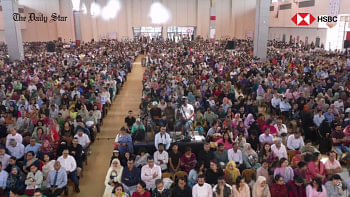Dearth of reliable energy a major concern for businesses
The shortage of reliable energy is a big concern for Bangladesh due to the country's dwindling natural gas reserves and the escalating global prices of fossil fuels, according to energy experts, as they advocated for alternatives such as renewables and liquefied petroleum gas (LPG).
At a meeting held yesterday at the Pan Pacific Sonargaon Dhaka, the experts said the nearly identical commercial energy usage in FY22 and FY23 shows the acuteness of the energy shortage faced by the industrial sector.
"For a developing country, this is not a positive sign for industrialisation," said Ijaz Hossain, former dean of the Bangladesh University of Engineering and Technology (Buet), during a presentation at the event organised by the Foreign Investors' Chamber of Commerce & Industry (FICCI).
"Despite an increase in the number of factories and their production, gas supply to the industrial sector has remained constant over the past decade. This demonstrates the acute energy crisis in industrial units," he added.
Referring to Petrobangla data, Hossain warned that if the current gas consumption continues, the country's gas supply could be depleted by 2030.
According to him, discovering new gas wells is urgent.
The energy expert said without drilling at least ten new wells annually, Bangladesh may become heavily reliant on imported liquefied natural gas (LNG).
According to Hossain, Bangladesh is also losing around 10 percent of the national grid supply to illegal connections, which equates to $1 billion per year.
"This is simply theft," he added. "It has become extremely shocking."
The energy expert suggested that if illegal gas connections to domestic households were factored in, the estimated losses would be even higher.
He suggested replacing the domestic gas supply with LPG gradually, even by offering subsidies to encourage its use.
Regarding renewable energy, the former Buet teacher said Bangladesh is likely the only country worldwide where the share of renewable electricity in total electricity generation has decreased over time.
He said the contribution of renewables to national power generation declined from 11 percent in 1990 to 1.33 percent in 2023.
"Importing energy is more expensive than importing food," said Hossain. "If the government allowed around 1 percent of farmland for solar panels, around 50,000 megawatts of electricity could be generated."
At the programme, Energy Adviser Muhammad Fouzul Kabir Khan criticised the previous government's energy tariffs.
"The previous government set exuberant tariffs by claiming the sector was in emergency. But how long can an emergency persist?" he questioned.
"We have dismantled the corrupt practices established by the previous government over the past 15 years," he claimed. "The previous government bypassed the Bangladesh Energy Regulatory Commission (BERC) for setting prices, but we have restored the commission's authority.'
Khan mentioned that the current government is revising renewable energy policies. It is developing a renewable energy park in Jabalpur, where the government will provide land and transmission lines to the private sector.
The government's primary objective is to reduce subsidies in the power sector by lowering the cost of power procurement, he said.
Zaved Akhtar, president of FICCI, said investment decisions by entrepreneurs are heavily influenced by the availability of reliable energy solutions.
He called for a comprehensive roadmap for renewable energy development.
Similar to Hossain, Badrul Imam, an honorary professor at the Department of Geology at Dhaka University, suggested that Bangladesh should prioritise gas exploration, as it has not invested sufficiently in this area.
M Rezwan Khan, a professor emeritus at the Department of Electrical and Electronic Engineering at United International University, proposed allowing industries to install solar panels on their factory premises.
Mollah Amzad Hossain, editor of the Energy & Power Magazine and Nowshad Ali, country manager of GE Vernova Bangladesh, were also present.

 For all latest news, follow The Daily Star's Google News channel.
For all latest news, follow The Daily Star's Google News channel. 



Comments